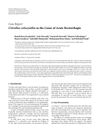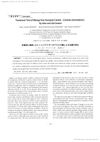 4 citations,
September 2014 in “Elsevier eBooks”
4 citations,
September 2014 in “Elsevier eBooks” Use some skin medications with caution during pregnancy; avoid strong steroids, certain eczema treatments, and systemic retinoids, but many topical treatments and nasal sprays are safe.
 October 2023 in “Cognizance journal”
October 2023 in “Cognizance journal” The document suggests using natural remedies like bloodletting and honey for various health issues but lacks scientific evidence for their effectiveness.
 1 citations,
March 1992 in “Postgraduate Medicine”
1 citations,
March 1992 in “Postgraduate Medicine” About 40% of women by age 60 experience significant hair loss, often due to androgenetic alopecia, with treatments like minoxidil available and hope for future cures.
 2 citations,
January 2017 in “Clinical and medical investigations”
2 citations,
January 2017 in “Clinical and medical investigations” Herbal lotions are effective for severe hair loss, with a 64.8% success rate, but relapse is common and long-term management requires allergen control and possible corticosteroid use.
 September 2023 in “Journal of pharmacognosy and phytochemistry”
September 2023 in “Journal of pharmacognosy and phytochemistry” Plumbago zeylanica has valuable medicinal properties but needs sustainable cultivation methods.
20 citations,
December 2021 in “Plants” Tamarix aphylla may be effective for various medical conditions, but more research is needed to confirm its safety and effectiveness.
 24 citations,
January 2014 in “The American Journal of Chinese Medicine”
24 citations,
January 2014 in “The American Journal of Chinese Medicine” The leaves of Platycladus orientalis have potential health benefits but require more research for safety and understanding how they work.
 9 citations,
January 2013 in “Case reports in emergency medicine”
9 citations,
January 2013 in “Case reports in emergency medicine” Eating Citrullus colocynthis can cause severe intestinal bleeding and damage.
 September 2021 in “International journal of Ayurveda and pharma research”
September 2021 in “International journal of Ayurveda and pharma research” Ayurvedic treatment improved hypothyroidism in a 30-year-old man.
 2 citations,
January 2014 in “Springer eBooks”
2 citations,
January 2014 in “Springer eBooks” The book details skin conditions in older adults, their link to mental health, cancer treatment importance, hair loss remedies, and managing autoimmune and itchy skin.
 9 citations,
March 2011 in “Oxidative stress and disease”
9 citations,
March 2011 in “Oxidative stress and disease” Some herbal treatments are effective for skin disorders, but more research and regulation are needed.
 1 citations,
November 1953 in “Archives of Dermatology”
1 citations,
November 1953 in “Archives of Dermatology” The document discusses various challenging skin conditions and their treatments.
 April 2023 in “Tikrit journal of pharmaceutical sciences”
April 2023 in “Tikrit journal of pharmaceutical sciences” Most people in Tikrit, Iraq, have used herbal medicine, mainly for hair, skin, and digestive issues, hoping for effective treatments.
 88 citations,
January 2011 in “Annals of Dermatology”
88 citations,
January 2011 in “Annals of Dermatology” The document concludes that specific itchy skin diseases during pregnancy have varying fetal risks and treatments, including corticosteroids and other medications.
 165 citations,
February 2014 in “Phytotherapy Research”
165 citations,
February 2014 in “Phytotherapy Research” Myrtle has various health benefits and potential for medicine development.
 32 citations,
January 2021 in “Molecules”
32 citations,
January 2021 in “Molecules” Some Middle Eastern plants may help treat diabetes and could be alternatives to current drugs, but more research is needed.
 47 citations,
May 2002 in “Journal of Cutaneous Medicine and Surgery”
47 citations,
May 2002 in “Journal of Cutaneous Medicine and Surgery” Pregnancy can cause normal skin changes that usually go away after childbirth and don't need treatment.
 26 citations,
June 2012 in “The Journal of Obstetrics and Gynecology of India”
26 citations,
June 2012 in “The Journal of Obstetrics and Gynecology of India” Most skin changes during pregnancy are harmless and temporary, but some can risk the fetus and need careful treatment.
 August 2009 in “Expert Review of Dermatology”
August 2009 in “Expert Review of Dermatology” Pregnancy can cause skin changes and conditions that need correct diagnosis and treatment for the health of the mother and baby.
 8 citations,
January 1996 in “Gynecological Endocrinology”
8 citations,
January 1996 in “Gynecological Endocrinology” Cyproterone acetate is the preferred treatment for women's hyperandrogenism when estrogen/progestogen use is safe.
 December 2020 in “Daehanhanuihakoeji”
December 2020 in “Daehanhanuihakoeji” Rumex japonicas Houttuyn ethanol extract helps increase hair growth and protect against hair damage.
 18 citations,
June 1995 in “International Journal of Dermatology”
18 citations,
June 1995 in “International Journal of Dermatology” Women experience various skin issues at different life stages, requiring careful treatment and awareness.
 191 citations,
February 2002 in “Archives of Dermatology”
191 citations,
February 2002 in “Archives of Dermatology” Some herbal therapies may help with skin conditions, but more research is needed to confirm their safety and effectiveness.
 24 citations,
March 2015 in “Best Practice & Research in Clinical Obstetrics & Gynaecology”
24 citations,
March 2015 in “Best Practice & Research in Clinical Obstetrics & Gynaecology” Some skin conditions are common during pregnancy and can be safely treated without affecting the pregnancy outcome.
 April 2024 in “MGM Journal of Medical Sciences”
April 2024 in “MGM Journal of Medical Sciences” Traditional Indian home remedies are effective and culturally important.
 11 citations,
January 2014 in “International Journal of Trichology”
11 citations,
January 2014 in “International Journal of Trichology” Witch hazel-based hair products improved scalp irritation and were well-tolerated.
 April 2014 in “Medical Clinics of North America”
April 2014 in “Medical Clinics of North America” Accurate diagnosis and tailored treatment are crucial for managing common primary care symptoms.
6 citations,
February 2021 in “Frontiers in Neurology” Cyclosporine-A can cause serious blood clots in the brain, so patients need careful monitoring.
 January 2005 in “Nihon Yasei Doubutsu Igakkaishi/Japanese journal of zoo and wildlife medicine”
January 2005 in “Nihon Yasei Doubutsu Igakkaishi/Japanese journal of zoo and wildlife medicine” Aloe vera gel effectively treated mange in camels.
 13 citations,
December 2017 in “BMC Complementary and Alternative Medicine”
13 citations,
December 2017 in “BMC Complementary and Alternative Medicine” The Asian herbal mix with Houttuynia cordata, Perilla frutescens, and green tea helped grow hair in mice.



























